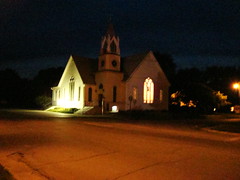I recently saw a classic film entitled "
A Man for All Seasons". It was a 1967 movie adaptation of Robert Bolt's stage play. The play and movie are based on
Sir Thomas More, who died at the (figurative) hands of King Henry VIII. More was executed by the King's court because he refused to bless Henry's claim as the head of the Church of England. Thomas More's ecclesiastical allegiance was to the Church of Rome, and many Protestants would question the biblical soundness of More's faith. Nevertheless, More was undoubtedly a man of conviction.
Having read Chapter 1 of "
The New Christians - Dispatches from the Emergent Frontier" by
Tony Jones, I feel like I'm watching a bizarre drama in
Theatre of the Absurd style. The primary conviction that Tony seems to project in his first chapter is that American church life is dying and the Emergent church is a life-saving medicine. Jones' treatment of Christianity is both comedic and tragic.
Tony sets the stage in his introduction. Hoping to convince the reader that the movement is an unstoppable organic force, Jones compares the Emergent church to a weed that can't be killed. The funny-sad part of that analogy is that Jesus Christ compared weeds (tares) to the work of Satan in
Matthew 13. Jesus used parables to illustrate great spiritual truths. Jones identifies himself, in the very back of the book, as a practical theologian. That apparently means a person who claims to study God, but who believes in the supremacy of pragmatism over Scripture. This first gaffe betrays a disregard for, or ignorance of, what the Holy Bible says about ecclesiastical matters.
The curtain opens as Tony Jones is sitting in the first-class cabin of a airline passenger jet. He weaves a story about a woman assigned to the seat next to him. Jones tells of trying to hide the fact he was reading a Bible as the plane takes off. Tony Jones, practical theologian and spokesman for the Emergent church, is ashamed to be caught reading his Bible!
Continuing on in the second paragraph of the first chapter, Mr. Jones shifts the focus to laptop computers, hers verses his. He tells us that he's busy writing a Bible study on his laptop, but he draws our attention to the woman. He practically gushes over her in his description. Despite using the word "Bible a couple of times, Tony Jones paints a very carnal picture in this opening scene. The climax of the plane ride occurs halfway through the flight, when the woman pulls out a rosary and leans back in her seat to pray. As Tony relates it, she prays to the "Blessed Virgin".
Not being swayed by what the Bible says...Tony Jones overlooks the fact that Mary, the earthly mother of Jesus, lost her virgin status when she had other children (
Mat. 12 &
13). He fails to connect
Luke 2:21-39 with
Leviticus 12:2-6 which demonstrate Mary to be a sinner. Tony doesn't stop to question the biblical ramifications of praying to Mary. No, Tony Jones is on a mission to script an engaging segue to the main act of Chapter 1. Tony's purpose in this airline drama is to hold the woman up as picture of religion that doesn't look like religion.
The woman on the plane is merely a literary tool, a device, to introduce a "spiritual itch" that comes out of "the air". Put those thoughts of
2 Timothy 4:3 and
Ephesians 2:2 out of your minds, friends. You're not going to benefit from this chapter unless you cast out all thoughts of the Bible!
The plot of this absurd tale proceeds into a down-hill slide from the sixth paragraph. Jones proceeds to narrate a tour of 20th Century American Christianity. He talks about left and right, claiming that liberalism represents the "high church" and conservatism represents the "low church". He begins to exploit divisions between left and right, so he can put "kite flying", disenchanted Christians squarely in the middle. Christ remains somewhere backstage, muzzled, and out of sight.
Jesus has no part in Tony's Chapter 1 new christian drama. Christ is not mentioned except for a reference to the UCC denomination, and an offhand mention of the term "Christ-like". Jones willfully leaves the Holy Bible and Jesus Christ out of all of his discussion of what a church is or should be.
One of the most comical and tragic highlights in the main act is when Mr. Jones sets up the straw man of "foundationalism" to show us "the real problem". Tony Jones wants you to accept his premise that biblical-faith is self-defeating. He attempts to kill foundationalism by acting out an imaginary conversation between a low-church Bible-believer and a skeptic. Jones lays down a series of vacuous questions and answers to prove that anyone who trusts in the Bible as Truth is a rube. That kind of thinking, to use his words, is "infinite regression". Tony says there isn't any "rock-bottom" foundation that defines what it means to be Christian. (SPOILER, Mr. Jones: Jesus Christ is Truth [
John 14:6], the great I AM [
John 8:58;
Rev 1:8], and the foundation of His Church [
Mat 16:18;
1Co 3:11]. Jesus Christ is a foundationalist!)
No, don't walk out of the theater yet! What about the chickens?
If you believe the Bible has no authority in a church or Christian life, then Tony Jones has a church for you. If you think that Jesus is whoever you want him to be, then Tony Jones has a new christian movement you can join. If you are willing to throw your Bible out the window at 30,000 feet, then come join the Emergent church. It's coming soon to a location near you!
